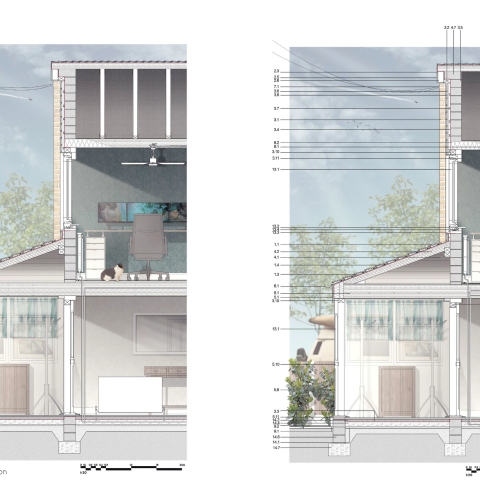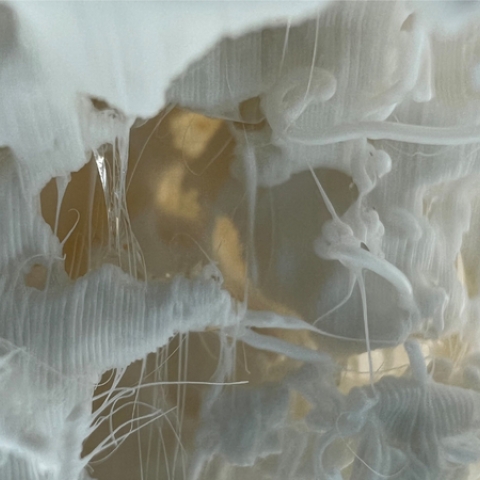

Historic Environments, Heritage and Conservation Research
Explore our research expertise in historic environments and conservation
There's a lack of understanding of the importance of heritage sites – not just the physical buildings and sites, but also their intangible dimensions, such as the stories they tell, the memories they hold, and their contemporary social values among current communities.
Through our research in Historic Environments, Heritage and Conservation, we're looking at how architecture, community and creative and digital practices can play a role in enhancing historic environments. By preserving the physical cultural heritage, and recording intangible and social values of sites, we work to build aspiration, pride, engagement and ownership over peoples' heritage and past.
This is particularly important because recent figures show that engagement with cultural heritage is decreasing, particularly in younger generations. This issue demands better integration of heritage into research and teaching, and new methods for representing cultural heritage and historic environments are needed. Therefore, we believe in promoting the contribution of design as well as creative and digital methodologies to the revival of heritage and historic environment and the dissemination of wider social, environmental, and economic benefits of the conservation and adaptive reuse practices.
To that end, we're working to understand cultural aspects and through our work, aim to inform the regeneration process and produce culturally-accepted urban environment and city planning strategies. With the existence of the University of Portsmouth Heritage Hub, we aspire to continue using participatory and co-creation approaches and integrate wider cross-disciplinary and interdisciplinary collaborations and explorations to bring about holistic and engaging solutions in collaborations with communities and stakeholders.
We've presented our research at local and international conferences, and our work is frequently published in books and journals – including the Journal of Cultural Heritage, Identities Journal, the Architectural History Journal, and the International Journal of Heritage Studies.
Our research covers the following topics
- Digital heritage
- Urban heritage
- Historic interiors
- Reuse
- Regeneration
- Conservation theory
- Heritage and conflict
- Architectural conservation
- Urban conservation
- Digital preservation
- Conservation technologies
- Sustainable conservation
- Community-based conservation
Methods
We use qualitative research techniques, such as interviews, questionnaires and focuses groups, to capture peoples' values and positions. Creative and analysis technologies can be used to record existing environment, as well as represent possible interpretation and integration policies.
The Cultural Heritage Research group also features interdisciplinary research and activities that frequently lead to collaborative projects between architecture, humanities and technologies, while our MA Conservation Architecture and MArch Design Studios degrees also reinforce this theme through teaching.
Collaborations and funders
In the UK, we collaborate with Historic England and English Heritage, who facilitate research on sites. Overseas, we work with universities in Lebanon and Egypt, facilitating oversea collaboration and possible Global Challenges Research Funding (GCRF).
Recent project highlights
-
Co-Visualisation of the invisible past using the present values and debates
This project is part of a bigger collaboration between the university and the Fishbourne Roman Palace Museum that aims to reframe the current interpretation of the palace through the co-creation of digital interpretations that engage younger generations in exploring the ruins.
-
Regenerating Cities during Crisis: Culturally-Routed and sustainable strategies for Middle Eastern Cities
The network aims to offer networking and educational activities concerning urban regeneration, a crucial working and research issue in Middle Eastern cities particularly after the Syrian crisis which affected Syrian cities as well as the cities in neighbouring countries (for example Jordan).
-
Establishing and Connecting the Communities of Tyneham Village
This fund is meant to support the researchers to collaborate with MOD in exploring and connecting different communities related to Tyneham Village and bringing them together to explore the potential of the site and possible large-scale, collaborative research and educational projects that could be launched as part of telling the site stories and heritage narratives in an inclusive way.
-
Enabling XR Enterprise
This project enables the piloting of crucial XR support for Portsmouth Tourism, lowering the barrier of entry to XR technology. eXRe will maximise benefits of an innovative world-class local facility to directly meet Portsmouth’s challenges and strategic priorities, present and future.
-
“Unpath'd Waters”: Marine and Maritime Collections in the UK
Integrate the UK's marine and maritime heritage collections; establish meaningful links between wreck sites, artefacts; transform our ability to search those collections; use Al and machine learning to create innovative ways of searching these collections to generate entirely new ways of understanding this heritage.
-
Towards a Smart Village Framework: Critical Heritage and Community Heritage Narratives to Unravelling, Co-Creating and Re-Creating Rural Heritage
The project provides an essential research step that informs future work on smart village frameworks for resilient and sustainable development and community wellbeing. The work will be developed in collaboration with Fishbourne and Weald and Downland Museums and local communities from their related villages (Fishbourne and Singleton).
Recent publication highlights
-
The Role of Architectural Heritage in offering a more resilient lockdown in Egypt
Teba, T., ElZoghby, N., Gharib, N. (2021) "The Role of Architectural Heritage in offering a more resilient lockdown in Egypt", Health & Environmental Resilience and Livability in Cities (HERL)
-
Destruction, heritage and memory: post-conflict memorialisation for recovery and reconciliation
Ece Atabay, Z., Macedonio, A., Teba, T., Gül Ünal, Z. (2022) "Destruction, heritage and memory: post-conflict memorialisation for recovery and reconciliation", Journal of Cultural Heritage Management and Sustainable Development
Discover our areas of expertise
Historic environments and conservation is one of our 8 areas of research expertise in Architecture, Interiors and Urbanism – explore the other 7 below.
Interior architecture and interior design
We're investigating how architects and designers might rethink the way they approach interior spaces, by exploring how buildings are used by people.

Architecture Technologies and Devices
Through our research, we're re-thinking the way we build cities, to better react to environmental issues and challenges, such as climate change.

Architecture and Interior Design Studios Pedagogies
We're researching issues related to teaching and learning within creative and design disciplines, focusing on pedagogy, curriculum, student engagement, and learning theories.

Computational Culture and Technologies in Architecture and Urban Design
We're studying the integration of digital technology and new technologies in architectural planning, urban planning, and sustainability – and how they can impact future design processes.

Our members
Dr Tarek Teba
Research groups
Architecture and Urban Design: Histories and Theories
We're researching narratives of place and the construction of new historiographical and theoretical discourses in architecture, interiors, landscape, and urbanism.

Interested in a PhD in Architecture, Interiors & Urbanism?
Browse our postgraduate research degrees – including PhDs and MPhils – at our Architecture, Interiors & Urbanism postgraduate research degrees page.
